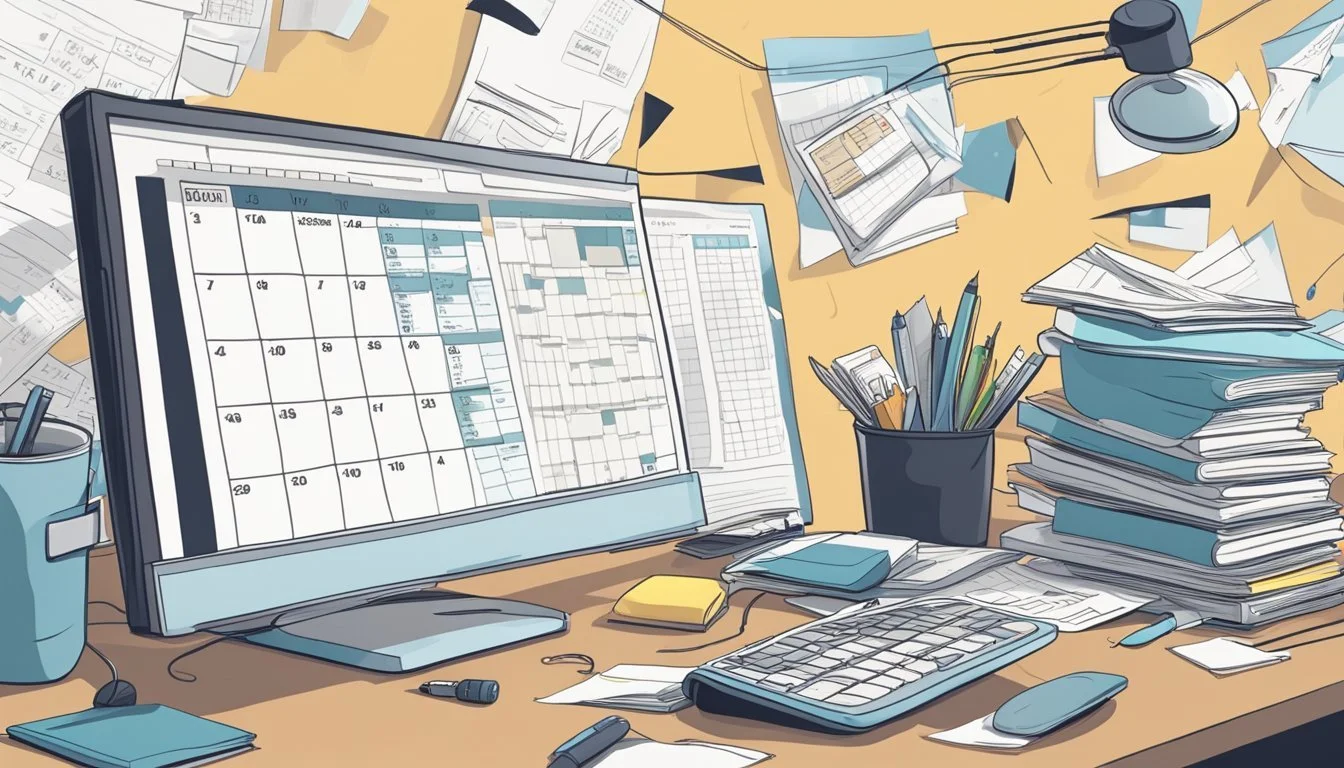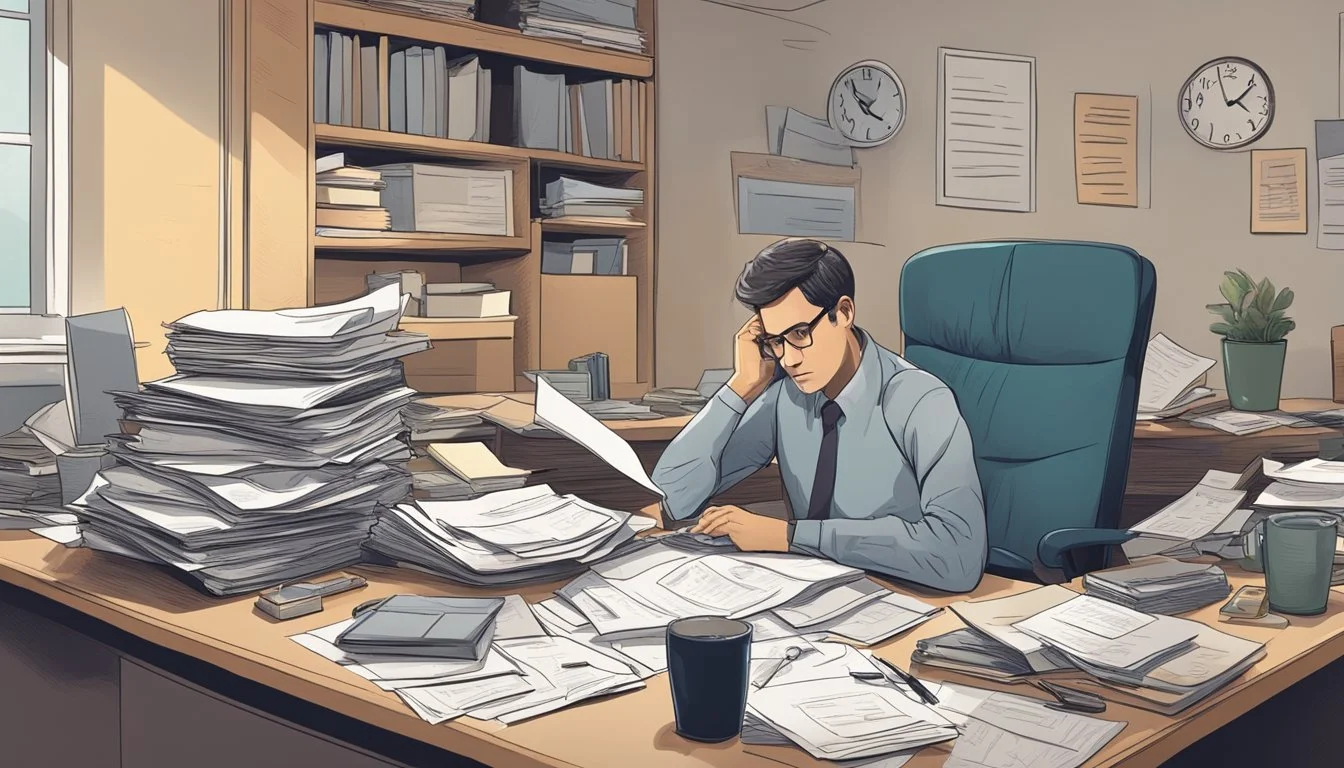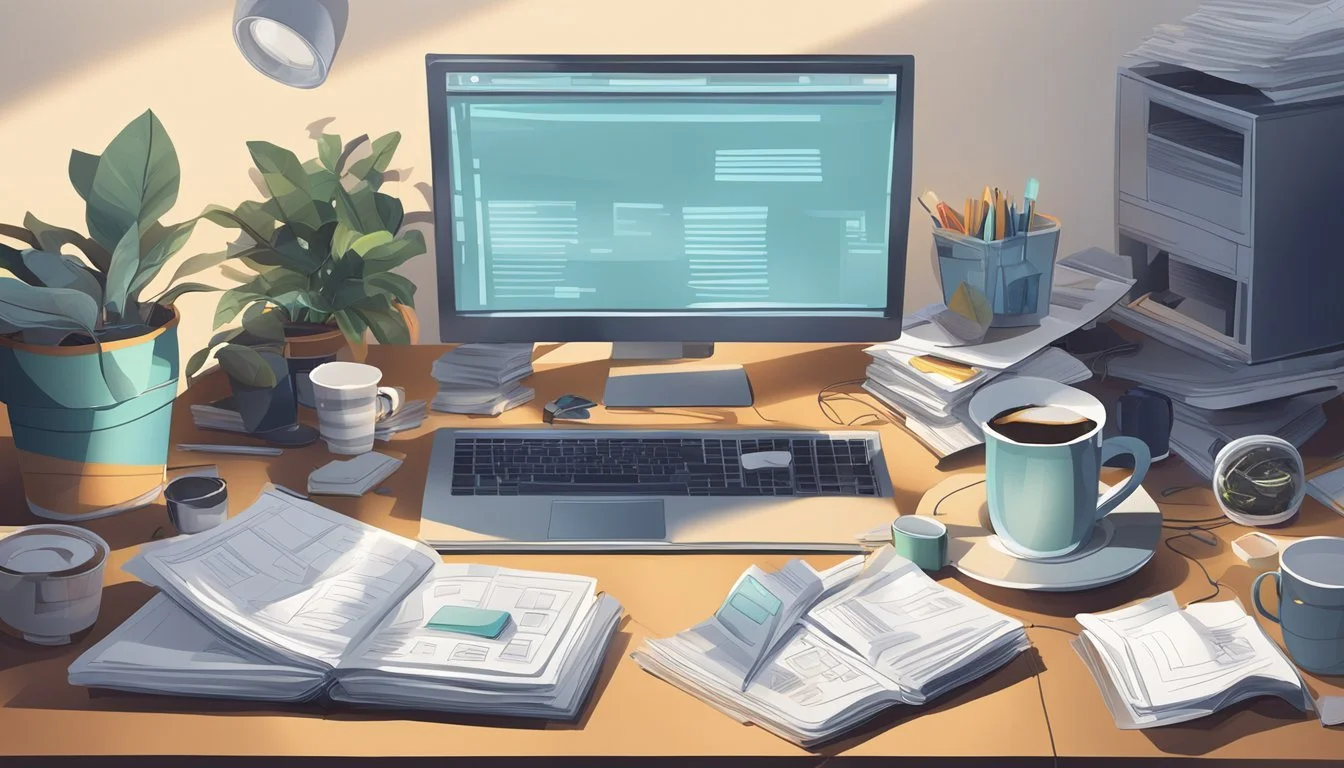11 Workplace Habits That Secretly Drain Your Energy
Identifying and Overcoming Productivity Killers
The modern workplace can be a source of both productivity and stress. While many focus on improving efficiency and output, less attention is often paid to the subtle habits that gradually deplete our energy throughout the day. These seemingly innocuous behaviors can accumulate over time, leaving employees feeling drained and less effective.
Recognizing and addressing energy-draining habits is crucial for maintaining productivity and well-being at work. By identifying these hidden culprits, individuals can make small but impactful changes to their daily routines. This article explores 11 common workplace habits that may be secretly sapping energy, offering insights into how to combat them and boost overall vitality on the job.
1) Multitasking Madness
Multitasking has become a common workplace habit, with many employees attempting to juggle multiple tasks simultaneously. Despite its perceived efficiency, this practice often leads to decreased productivity and increased mental fatigue.
Research shows that the human brain is not designed for true multitasking. Instead, it rapidly switches between tasks, causing a loss of focus and attention with each transition.
This constant shifting can result in more errors, reduced work quality, and longer completion times for individual tasks. The mental strain of multitasking can leave workers feeling drained and overwhelmed by the end of the day.
Additionally, multitasking can impair cognitive abilities and decrease overall job satisfaction. Employees who frequently multitask may experience higher levels of stress and difficulty concentrating on important tasks.
To combat this energy-draining habit, workers should prioritize tasks and focus on one item at a time. Implementing time management techniques and creating a structured work schedule can help improve productivity and reduce the urge to multitask.
By recognizing the negative impacts of multitasking and taking steps to avoid it, employees can preserve their mental energy and enhance their performance in the workplace.
2) Procrastination Patterns
Procrastination is a common workplace habit that secretly drains energy and productivity. Many employees fall into the trap of delaying important tasks, often without realizing the negative impact on their performance and well-being.
One common pattern is the "last-minute rush," where workers put off assignments until just before deadlines. This creates unnecessary stress and often results in lower-quality work due to time constraints.
Another pattern is the "perfectionist procrastinator," who avoids starting tasks out of fear of not meeting impossibly high standards. This leads to wasted time and increased anxiety as projects remain unfinished.
The "distraction seeker" is prone to finding other activities to occupy their time, such as browsing social media or engaging in non-essential conversations with colleagues. This habit fragments focus and reduces overall productivity.
Some employees exhibit the "overwhelmed avoider" pattern, postponing large or complex tasks because they seem too daunting. Breaking projects into smaller, manageable steps can help overcome this tendency.
Recognizing these procrastination patterns is the first step toward developing more effective work habits. By addressing these behaviors, employees can reclaim lost energy and improve their workplace performance.
3) Endless Email Checking
Constantly checking work emails can secretly drain an employee's energy throughout the day. This habit interrupts focus and workflow, causing frequent context switching that taxes the brain.
Many professionals feel compelled to respond immediately to every notification. However, this constant reactivity prevents deep concentration on important tasks.
The anticipation of new messages creates low-level stress. Even when no urgent emails arrive, the act of checking still disrupts mental processes.
Email overload can lead to decision fatigue. Employees may spend significant mental energy determining how to prioritize and respond to numerous messages.
Setting specific times to batch-process emails is more efficient. This allows for uninterrupted periods of productive work between email sessions.
Turning off email notifications can help break the cycle of constant checking. Employees can regain control of their attention and energy levels.
Training oneself to check email less frequently may feel uncomfortable at first. However, it often results in improved productivity and reduced stress over time.
4) Skipping Breaks
Many employees fall into the trap of working through their breaks in an attempt to be more productive. This habit, however, can have the opposite effect and secretly drain energy throughout the workday.
Taking regular breaks allows the mind and body to recharge. Without these pauses, mental fatigue sets in more quickly, leading to decreased focus and efficiency.
Skipping lunch breaks or working through them can negatively impact nutrition and hydration. This may result in low blood sugar and dehydration, both of which contribute to afternoon energy slumps.
Continuous work without breaks can increase stress levels and muscle tension. Over time, this may lead to physical discomfort and reduced overall well-being in the workplace.
Employees who take breaks are often more creative and better at problem-solving. Stepping away from work periodically allows for fresh perspectives and renewed mental clarity.
To combat this energy-draining habit, workers should prioritize regular short breaks throughout the day. Even brief pauses for stretching, walking, or mental relaxation can significantly boost energy levels and productivity.
5) Negative Self-Talk
Engaging in negative self-talk is a common workplace habit that can significantly drain energy levels. Employees who constantly criticize themselves or doubt their abilities create unnecessary stress and anxiety.
This harmful mental pattern consumes valuable cognitive resources, leaving individuals feeling mentally and emotionally exhausted. The constant barrage of negative thoughts can lead to decreased motivation and productivity.
Self-criticism often manifests as internal dialogue that undermines confidence and self-esteem. Phrases like "I'm not good enough" or "I'll never succeed" become recurring thoughts that sap mental energy throughout the workday.
Employees who struggle with negative self-talk may find themselves less resilient in the face of challenges. They may also experience difficulty focusing on tasks and making decisions, further contributing to feelings of fatigue.
Recognizing and addressing negative self-talk is crucial for maintaining energy levels at work. Developing more balanced and realistic thoughts can help preserve mental resources and promote a more positive work experience.
6) Poor Posture
Slouching at your desk can silently sap your energy throughout the workday. When you maintain poor posture, your muscles have to work harder to keep your body upright, leading to unnecessary fatigue.
Sitting with rounded shoulders and a hunched back compresses your diaphragm, making it harder to breathe deeply. This reduces oxygen flow to your brain and body, contributing to tiredness and decreased focus.
Poor posture can also cause muscle tension and pain, particularly in the neck, shoulders, and lower back. This discomfort can be distracting and energy-draining, making it harder to concentrate on tasks.
Over time, consistently poor posture can lead to more serious issues like chronic pain and reduced flexibility. These long-term effects can further deplete your energy reserves both at work and in your personal life.
To combat this energy drain, make a conscious effort to sit up straight, keep your shoulders back, and align your ears with your shoulders. Take regular breaks to stand up, stretch, and reset your posture throughout the day.
7) Unclear Goals
Working without well-defined objectives can silently sap energy and motivation. Employees may find themselves unsure of priorities or how their efforts contribute to the bigger picture. This uncertainty can lead to frustration and a lack of direction.
Vague or constantly shifting goals create confusion and stress. Team members may struggle to focus their efforts effectively, wasting time and mental resources. The absence of clear targets makes it difficult to measure progress or feel a sense of accomplishment.
Unclear goals can also hinder collaboration. When team members have different understandings of objectives, it can lead to misaligned efforts and unnecessary conflicts. This disharmony further drains energy that could be better spent on productive work.
To combat this energy drain, organizations should establish and communicate clear, specific, and measurable goals. Regular check-ins and progress updates help keep everyone aligned and motivated. By providing a clear roadmap, companies can energize their workforce and channel efforts more efficiently.
8) Long Meetings
Long meetings can be a significant source of energy drain in the workplace. These extended sessions often result in decreased productivity and mental fatigue.
Participants may find themselves struggling to maintain focus as the meeting drags on. This can lead to a loss of valuable insights and contributions from team members.
Extended meetings frequently disrupt individual work schedules, causing stress and anxiety about unfinished tasks. This added pressure can deplete energy reserves quickly.
Sitting for prolonged periods during lengthy meetings can also contribute to physical discomfort and reduced alertness. This physical strain further compounds the mental exhaustion.
To combat these energy-draining effects, organizations can implement strategies such as setting clear agendas, establishing time limits, and encouraging brief, focused discussions.
Breaking longer meetings into shorter, more targeted sessions can help maintain engagement and preserve energy levels throughout the workday. This approach allows for necessary breaks and time to process information.
By recognizing the impact of long meetings on employee energy, companies can take steps to create more efficient and energizing work environments.
9) Overcommitting
Overcommitting is a common workplace habit that can significantly drain energy levels. Many professionals take on more tasks than they can realistically handle, believing it will boost their productivity or impress their superiors.
This tendency to say "yes" to every request often leads to increased stress and decreased performance. Employees who overcommit find themselves constantly rushing to meet deadlines, sacrificing quality for quantity.
The pressure to fulfill multiple obligations simultaneously can result in mental fatigue and reduced focus. As tasks pile up, individuals may experience anxiety and overwhelm, further depleting their energy reserves.
Overcommitting also leaves little time for rest and self-care, essential components of maintaining high energy levels at work. Without adequate breaks, employees risk burnout and diminished job satisfaction.
To avoid this energy drain, professionals should learn to set realistic boundaries and prioritize tasks effectively. Assessing workload capacity before accepting new responsibilities helps maintain a balanced and sustainable work schedule.
10) Cluttered Workspace
A disorganized desk can be a significant energy drain in the workplace. Clutter creates visual chaos that makes it harder to focus and locate necessary items.
Employees may waste precious time searching for documents or supplies amidst the mess. This constant struggle with disorganization can deplete mental resources throughout the day.
A cluttered workspace may also increase stress levels and anxiety. The visual reminder of unfinished tasks and pending work can feel overwhelming.
Maintaining a tidy desk helps improve productivity and concentration. It allows for a clearer mind and smoother workflow.
Taking a few minutes each day to organize the workspace can make a big difference. Putting away unnecessary items and filing papers in their proper place prevents clutter buildup.
A clean desk also creates a more professional appearance. It shows attention to detail and respect for the shared office environment.
11) Lack of Sleep
Insufficient sleep is a major energy drain in the workplace. When employees don't get enough rest, their cognitive abilities suffer, leading to decreased productivity and focus.
Sleep deprivation can impair decision-making skills and reduce creativity. Workers may find it harder to solve problems or come up with innovative ideas when they're running on low sleep.
Physical reactions slow down with lack of sleep, potentially increasing the risk of accidents or errors on the job. This is especially concerning for those in roles that require quick reflexes or precision.
Emotional regulation becomes more difficult without adequate sleep. Employees may experience mood swings, irritability, or increased stress levels, affecting their interactions with colleagues and clients.
Sleep-deprived individuals often rely on caffeine or sugary snacks for energy boosts. While these provide temporary relief, they can lead to energy crashes later in the day.
To combat this energy drain, establishing consistent sleep patterns is crucial. Aiming for 7-9 hours of sleep per night can significantly improve workplace performance and overall well-being.
Understanding the Impact of Energy-Draining Habits
Energy-draining habits can significantly affect workplace productivity and personal well-being. Recognizing these habits and their effects is crucial for maintaining optimal performance and job satisfaction.
Why Energy Management Matters
Effective energy management is essential for sustained workplace success. High energy levels contribute to increased focus, creativity, and overall job performance. Employees with good energy management tend to be more engaged and productive throughout the day.
Poor energy management can lead to decreased output, missed deadlines, and strained workplace relationships. It may also result in higher stress levels and potential burnout. Recognizing and addressing energy-draining habits can help prevent these negative outcomes.
Proper energy management also supports better work-life balance. Employees who maintain their energy levels at work are more likely to have fulfilling personal lives outside the office.
Common Symptoms of Low Energy
Low energy manifests in various ways in the workplace. Physical symptoms often include fatigue, drowsiness, and difficulty concentrating. Employees may find themselves yawning frequently or struggling to stay awake during meetings.
Mental symptoms can include forgetfulness, irritability, and decreased motivation. Tasks that were once easy may become challenging, and decision-making abilities may suffer. Low energy can also lead to procrastination and a tendency to avoid complex tasks.
Emotional symptoms might include mood swings, increased sensitivity to stress, and a general feeling of disengagement from work. Employees may experience a lack of enthusiasm for projects they once found exciting.
Recognizing these symptoms is the first step in addressing energy-draining habits and improving overall workplace performance.
Identifying Energy Drains in the Workplace
Recognizing workplace habits that deplete energy is crucial for maintaining productivity and wellbeing. These drains can stem from physical surroundings as well as mental and emotional factors.
Physical Environment Influences
A cluttered workspace can significantly impact energy levels. Disorganized desks and overflowing inboxes create visual chaos, leading to mental fatigue. Poor lighting strains the eyes and can cause headaches, while uncomfortable seating leads to physical discomfort and decreased focus.
Temperature extremes also play a role. Overly cold or hot environments force the body to expend energy on temperature regulation rather than work tasks. Noisy surroundings disrupt concentration and increase stress levels.
Air quality affects energy too. Stuffy, poorly ventilated spaces can cause drowsiness and decrease cognitive function. Regular exposure to indoor pollutants may lead to health issues that further drain vitality.
Emotional and Mental Factors
Negative workplace relationships can be major energy zappers. Difficult coworkers, unsupportive managers, or toxic team dynamics create stress and emotional exhaustion. Constant criticism or lack of recognition diminishes motivation and enthusiasm.
Overwhelming workloads and unrealistic deadlines induce anxiety and burnout. The pressure to multitask splits attention and depletes mental resources. Lack of clear priorities or direction can lead to decision fatigue and reduced productivity.
Monotonous tasks or lack of challenges can also drain energy through boredom and disengagement. Without opportunities for growth or meaningful work, employees may feel stuck and unmotivated.
Frequent interruptions, such as excessive meetings or constant notifications, disrupt focus and require additional energy to refocus on tasks.
Strategies to Combat Energy Drains
Effective strategies can help employees overcome workplace energy drains and boost productivity. Implementing time management techniques and fostering a supportive culture are key approaches.
Implementing Effective Time Management
Prioritize tasks using methods like the Eisenhower Matrix, categorizing work by urgency and importance. Set clear goals and deadlines for each project to maintain focus and momentum.
Use time-blocking techniques to allocate specific periods for different activities, reducing multitasking and increasing efficiency. Take regular breaks to recharge, following methods like the Pomodoro Technique with 25-minute work intervals.
Minimize distractions by turning off notifications during focused work periods. Delegate tasks when appropriate to distribute workload and leverage team strengths.
Creating a Supportive Workplace Culture
Encourage open communication among team members to address concerns and share ideas. Implement a feedback system that allows employees to voice opinions and suggestions anonymously.
Promote work-life balance by respecting boundaries and avoiding after-hours communication. Offer flexible working arrangements when possible to accommodate different productivity patterns.
Organize team-building activities to foster positive relationships and reduce workplace tensions. Provide resources for stress management, such as meditation spaces or workshops on mindfulness techniques.
Recognize and reward employees for their achievements to boost morale and motivation. Create opportunities for professional development to keep staff engaged and invested in their roles.











